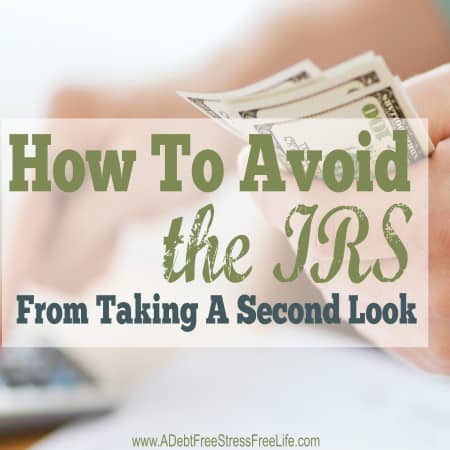A Mess Free Life may collect a share of sales or other compensation from the links on this page.

On the front page of almost every money web site I frequent is a list of the top ten reasons the IRS may take a closer look at your tax return.
I for one hate to read this stuff, fearing just giving it a little attention will bring the IRS knocking on my door. Silly, I know.
But, what’s not silly is the number of audits that are done each year. These audits, in an effort to keep costs contained, will be done primarily by mail – like that’s any consolation.
There are several red flags that make you prime picking to become the next IRS victim. Here ‘s how to avoid the IRS from taking a second look:
1. Making $200,000
For some reason if you make more than $200,000 a year you are 50% more likely to be audited than someone making less.
2. Consistently Filing A Business Loss
If you file a loss on your Schedule C year after year, you are more likely to get scrutinized by the IRS. Either you are loosing money year after year or taking deductions that put your taxable income below zero. Either way, not good.
3. Donations
Giving away more money than you possibly could afford. is a big red flag.
I am all for being generous, but don’t be ridiculous here and claim to have given money than you actually gave. That’s a no no on many different levels!
Make sure to have all donations documented.
4. Hiring Family
If you hire your family and claim the deduction you may invite more scrutiny by the IRS.
5. Preparing Your Taxes By Hand
Preparing your taxes by hand, although I can’t imagine anyone in their right mind doing this, will raise a red flag.
Not because the IRS is against you doing it the hard way, but rather when you don’t use tax preparation software you are more apt to have mathematical errors and miscalculations.
6. Money Overseas
Foreign bank accounts would raise a red flag for all the obvious reasons.
7. Cash Businesses
If you receive most of your income in cash, the IRS is more likely to audit you because of the increased opportunity to hide money from the government.
8. Rounding
Rounding your numbers is a bad idea as well – I guess he IRS doesn’t like them rounded up or down…just the actual number.
9. Large Transfers
Transferring large amounts of money from your business savings account to your personal savings account is a red flag.
All deposits over $10,000 must be reported by the bank to the federal government, but banks can report other lesser deposits if they suspect the money is coming from a less than reputable source.
10. Not Deducting
Not writing off common deductions raises a red flag as the government expects your business to run as other businesses in similar capacity. If you leave these deductions out the IRS will wonder what else you left out.
No one should cheat on their taxes. But these 10 red flags invites the IRS into your life when they are better left out.
